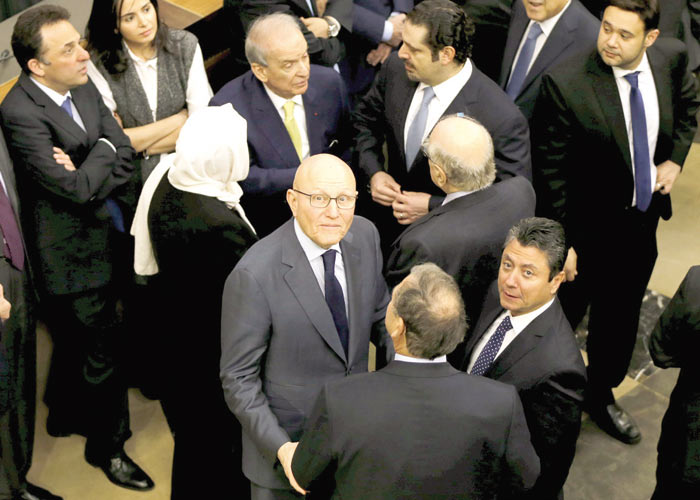Conventionality is a tool of Lebanese politicians
Mohamed Kawas/The Arab Weekly/September 04/16
Too much reliance on conventionality obstacles deepen social divisions to levels reminiscent of civil war times.
BEIRUT – Conventionality has been part of Lebanon’s political system since the country’s independence in 1943. It refers to the political elite’s commitment to a convention that established a social and political contract among the Lebanese — some sort of an unwritten spirit of the constitution. At conventionality’s heart lies veneration of partnership among Lebanon’s sects, especially in matters not clearly covered by the written constitution.
Lebanon has 18 religious confessions represented in parliament. The constitution does not provide for a confessional distribution of key government posts. The Lebanese have conventionally agreed that the president should be Christian Maronite, the parliament speaker Shia Muslim and the prime minister Sunni Muslim.
The convention also stipulates that the army’s commander be selected from among Christian Maronite officers. Despite the civil war (1975-90) and the 1989 agreement in the Saudi city of Taif on constitutional reforms that ended the war — including amendments to the prerogatives of the president, the cabinet and parliament — the Lebanese stuck to their conventions about the division of power.
The constitution says that parliament’s 128 seats should be evenly divided between Muslims and Christians; this is understood to include all constitutional institutions. Late prime minister Rafik Hariri, a key powerbroker in the Taif accord, always said; “We stopped counting.” With this, he underscored that power should always be shared evenly between Muslims and Christians despite Muslims outnumbering Christians.
Calls in 2012 by Hezbollah Secretary-General Sayyed Hassan Nasrallah for a constituent congress to rewrite the constitution and agree on a new political system have been widely interpreted as an attempt to replace the Muslim-Christian 50-50 division with a partition in thirds among Christians, Sunnis and Shias.
The Free Patriot Movement, led by Michel Aoun (the official head is Foreign Minister Gebran Bassil, Aoun’s son-in-law), spearheads a campaign against the Lebanese cabinet; it froze its ministers’ participation in cabinet meetings in protest attempts to extend the term of the army’s commander, General Jean Kahwaji. Prime Minister Tammam Salam insisted on having a cabinet meeting on August 25th, holding up his prerogatives as the one who sets the dates of the meetings and decides their agendas.
The Christian Phalange Party, led by Member of Parliament Sami Gemayel, withdrew its ministers from the cabinet in June. Labour Minister Sejaan Azzi, a Phalange Party member, rejected Gemayel’s orders and stayed in his post; he was ejected from the party. The Lebanese Forces Party, led by Samir Geagea, refused to take part in the cabinet. Some independent Christian ministers did not attend the meeting in a show of solidarity with their Aounist counterparts.
Aounists say Christian ministers who attended the meeting are poorly representative of Christian voters; hence, the cabinet meeting lost its conventionality. This triggered a verbal dispute between Aounist and independent Christian ministers. A key part in this disagreement was the minister of State for the Affairs of Displaced People, Alice Shabtini, an ally of former president Michel Suleiman, whose term expired in May 2014, and parliament has since failed to elect a successor. With the president’s post vacant, the cabinet as a whole assumes his powers, according to the constitution.
The Shia Amal-Hezbollah alliance pulled its ministers out of prime minister Fouad Siniora’s cabinet in November 2006 in protest against the cabinet’s measures to establish an international tribunal to look into Hariri’s assassination in 2005. The two parties, with the most Shia representatives in parliament, said their absence stripped the cabinet of conventionality. Nabih Berri, parliament’s speaker since 1992 and Amal’s leader since 1980, has refused to present draft laws prepared by Siniora’s cabinet for ratification by parliament on lack of conventionality claims.
Obviously, conventionality has become a tool by political forces to hinder decisions they deem unsavoury once legal and constitutional hindrances fail. Too much reliance on conventionality obstacles deepen social divisions to levels reminiscent of the civil war times, observers say, arguing that such non-constitutional hindrances amount to stirring primitive confessional bigotries.
Legal experts warn that such an approach may become a habit every time a confession feels uneasy about a certain matter. This would introduce interruptions to the cabinet, which has been generally unproductive since Suleiman stepped down and political forces failed to elect a successor. The presidential vacuum is a major assault to conventionality taking into consideration that Lebanon is the only Arab country led by a Christian president.
The Aounists’ insistence that Aoun be elected president although he does not have enough votes in parliament puts a spoke into the wheel of conventionality, the experts said. The observers warned that Salam may retaliate to the most recent Aounist campaign against the cabinet by stepping down, a move that would undermine the executive authority. Any conventionality whims would prove useless in such an eventuality.






















